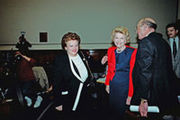
United States House Permanent Select Committee on Aging
Encyclopedia

United States House of Representatives
The United States House of Representatives is one of the two Houses of the United States Congress, the bicameral legislature which also includes the Senate.The composition and powers of the House are established in Article One of the Constitution...
between 1974 and 1992.
The committee was created with the intent not of forming legislation directly, but of conducting investigations and holding hearings. In such a manner it would spur legislation and other action via regular committee channels. The action to approve the committee was passed on October 8, 1974, by a 299–44 margin in the House.
The committee became operational in June 1975 and initially had 35 members. Its first chair was Missouri's William J. Randall
William J. Randall
William J. Randall was a former member of the United States House of Representatives. He was a member of the Democratic Party from Missouri....
. The committee soon grew to 65 members. Florida's Claude Pepper
Claude Pepper
Claude Denson Pepper was an American politician of the Democratic Party, and a spokesman for left-liberalism and the elderly. In foreign policy he shifted from pro-Soviet in the 1940s to anti-Communist in the 1950s...
, a powerful and influential member of Congress known for his commitment to representing the elderly, became chair in 1977 following Randall's retirement. In his late seventies and early eighties while chairing the committee, Pepper was renowned for his fast-paced presence in Congress; he used himself and the committee to focus attention against the problem of age stereotyping
Ageism
Ageism, also called age discrimination is stereotyping of and discrimination against individuals or groups because of their age. It is a set of beliefs, attitudes, norms, and values used to justify age based prejudice, discrimination, and subordination...
. The committee soon grew to 65 members. In 1983, Pepper stepped aside and Edward R. Roybal
Edward R. Roybal
Edward Ross "Ed" Roybal was a member of the Los Angeles, California, City Council for thirteen years and of the U.S. House of Representatives for thirty years.-Biography:...
of California became chair.
The committee conducted research and held public hearings into the issues affecting older Americans. Hearings were given titles, such as 1983's "Endless Night, Endless Mourning: Living with Alzheimer's". In particular, the committee held hearings and published a number of reports on elder abuse
Elder abuse
Elder abuse is a general term used to describe certain types of harm to older adults. Other terms commonly used include: "elder mistreatment," "senior abuse," "abuse in later life," "abuse of older adults," "abuse of older women," and "abuse of older men."...
, including Elder Abuse: An Examination of a Hidden Problem, Elder Abuse: A National Disgrace, and Elder Abuse: A Decade of Shame and Inaction.
The committee's work led to the passage of reform legislation intended to reform nursing home operations and reducing abuse against their patients. Also resulting were increased home care benefits for the aging as well as legislation establishing research and care centers for Alzheimer's Disease
Alzheimer's disease
Alzheimer's disease also known in medical literature as Alzheimer disease is the most common form of dementia. There is no cure for the disease, which worsens as it progresses, and eventually leads to death...
.
The committee's work came to an end on October 9, 1992, at the conclusion of the 102nd Congress
102nd United States Congress
-House of Representatives:- Senate :* President:Dan Quayle * President pro tempore: Robert Byrd - Majority leadership :* Majority Leader: George Mitchell* Majority Whip: Wendell Ford- Minority leadership :...
. It was not renewed during the 103rd Congress
103rd United States Congress
- House of Representatives :- Leadership :- Senate :* President: Dan Quayle , until January 20, 1993** Al Gore , from January 20, 1993* President pro tempore: Robert Byrd - Majority leadership :* Majority Leader: George Mitchell...
, as the House was under pressure to reduce its internal costs and to streamline the legislative process.

